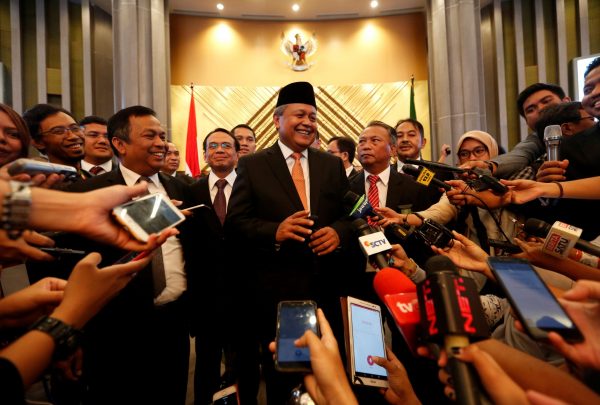This is reminiscent of the so-called ‘Taper Tantrum’ of 2013, when the Fed announced its decision to ‘taper’ its quantitative easing by no longer purchasing bonds and Treasury bond yields surged as a result. But for Indonesia, the recent rupiah depreciation is still normal and is not at its worst. The current account deficit is in the 2 per cent range against GDP and inflation is below 4 per cent. Although the rupiah has depreciated rapidly in the last couple of weeks, Indonesia has fared better than others, including Argentina, Turkey, Brazil and India. But this financial situation bears watching.
The potential vulnerability arising from capital inflow has been thoroughly discussed in the crisis literature. Financial shocks begin with a drastic influx of portfolio capital flows (resulting from a decrease in the Fed’s interest rate) that seek higher returns in emerging markets. In the short term, this portfolio investment helps boost economic growth in its beneficiaries, but it is not sustainable. Once the Fed normalises its monetary policy by raising interest rates, the capital flows flow back out again. This causes financial market volatility and depreciation of exchange rates, especially in countries that have problems with their current account deficit and inflation. Argentina and Turkey are examples.
To overcome this situation, central banks in emerging markets usually undertake stabilisation policy. This policy option is known as the impossible trinity. In essence, it is impossible for a country to simultaneously implement a fixed exchange rate, free capital flow and independent monetary policy. The central bank must choose two options out of the three. For Indonesia, under an open capital account regime, the choice available to the central bank is to either allow the rupiah to follow the market or to raise interest rates.
One vital lesson from Indonesia is the importance of getting the mix of policies right. Policy cannot rely on one sole instrument. Overly high interest rates increase the risk of bad debt in the banking sector, which in turn encourages more capital outflow. Overly tight fiscal policy can harm welfare programs and economic growth, and a significant exchange rate shock due to sudden reversal of capital flows (as happened during the Taper Tantrum) can create exchange rate hysteresis. This fear can become a self-fulfilling prophecy, which causes panic.
In the past month, Bank Indonesia has raised interest rates twice (by 25 basis points each time) and has introduced macro-prudential policies to calm financial markets. It is worth noting, however, that the effectiveness of fiscal, monetary and macro-prudential instruments is often limited. If capital inflows or outflows are excessive, Bank Indonesia and the government will be forced to take a drastic combination of steps, as it was forced to do in 2013. And that will adversely impact economic growth.
During the 2013 Taper Tantrum, Indonesia together with India, South Africa, Turkey and Brazil were categorised as the ‘fragile five’ — the five countries that were vulnerable to capital outflows — because they had high current account deficits. To prevent Indonesia from falling into a financial crisis triggered by massive capital outflows, the government and Bank Indonesia were forced to cut fuel subsidies (which increased fuel prices by an average of 40 per cent), raise the central bank rate by 200 basis points and allow the rupiah to follow the market.
So, why is history repeating itself?
Although a variety of reforms have been carried out, Indonesia remains vulnerable to external shocks.
The main source of this vulnerability originates from Indonesia’s dependence on portfolio financing in financing its current account deficit. In Indonesia, panic is usually triggered by the government bond market due to the relatively large role of foreign holders in funding government deficit financing. When a shock occurs in the United States, as happened during the Taper Tantrum and in the Fed’s rate normalisation, bond market investors withdraw their investment portfolios which then triggers turmoil in financial markets.
As for the current account deficit, a large current account deficit is not necessarily a bad thing as long as it is financed by long-term and productive foreign direct investment (FDI), for example in export-oriented sectors. If the current account deficit is financed by FDI, the risk of capital volatility is relatively small. But a large current account deficit may increase a country’s vulnerability if it is financed by portfolio investment, especially in the form of short-term debt, as in the case of the ‘fragile five’. These vulnerabilities might create nervousness in portfolio investors that then induces them to withdraw their portfolio investment from the affected countries.
If Indonesia does not resolve the root of the problem, then the fluctuations in capital flow will recur.
Indonesia should perhaps consider introducing a Tobin tax on international financial transactions to minimise the negative impact of short-term capital inflows in future. In addition, FDI inflows must be directed toward export-oriented sectors, especially manufacturing, to minimise the risk of currency mismatch and balance of payment pressures.
This will be possible only if the investment climate improves. Indonesia must strive to improve the financial deepening in the bond and capital markets by increasing the role of domestic investors and savings in these markets. Economic reforms also need to be aimed at increasing productivity through improvement in human resource quality, infrastructure development and improved governance. The government has indeed moved in this direction, but the effect will only be felt in the medium term.
M Chatib Basri is a Senior Lecturer at the Department of Economics, University of Indonesia and formerly Indonesia’s minister of finance.

